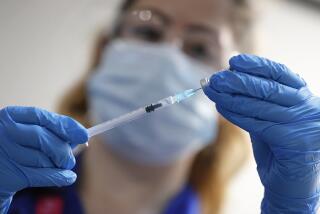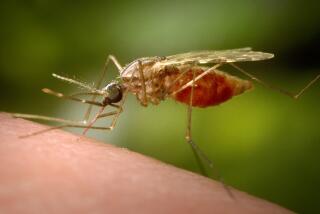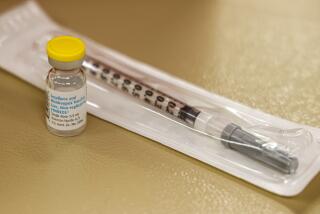Government shuts down HIV/AIDS vaccine trial
In another major setback for efforts to develop a vaccine to boost immunity to the human immunodeficiency virus, known as HIV, a key clinical trial was ordered shut down this week after an independent panel of safety experts found that participants getting the vaccine appeared to be slightly more likely to contract the virus and no better at suppressing its replication than those who got a placebo.
Investigators involved in recruiting volunteers and running the trial at 21 sites across the country, including the AIDS Research Alliance of America in Los Angeles, were ordered to stop immunizing volunteers with the genetically engineered HVTN 505 vaccine and to inform the subjects enrolled in the study whether they got the experimental vaccine or the placebo. Nearly 2,500 subjects participated -- 1,250 men or transgender people who have sex with men got the investigational vaccine, while 1,244 received the placebo vaccine.
The announcement came Thursday from the National Institutes of Health’s National Institute of Allergy and Infectious Diseases, or NIAID, which developed the HVTN 505 vaccine and launched the advanced clinical trial in 2009. In a statement released Thursday afternoon, NIAID said there was a “non-statistically significant increase in HIV acquisition among volunteers in the investigational vaccine group compared to those in the placebo group.”
This is third experimental HIV vaccine trial to end abruptly after early results proved disappointing. In 2005 and again in the so-called STEP study halted in 2007, trials of experimental vaccines were halted. In the second of those, participants who got the active vaccine were found to have higher rates of infection than those who did not.
Among volunteers who had been in the study a minimum of 28 weeks--enough time for the vaccine to have prompted the expected immune response--27 HIV infections occurred among the vaccine group and 21 among those who got the placebo. Of 23 volunteers who became infected with HIV in the first 28 weeks of the study, 14 had received the three-shot investigational vaccine regimen and nine had received the placebo.
The experimental vaccine, which was designed to prime the immune system to mount a robust defense against all three subtypes of HIV virus, was also a disappointment in its primary aim -- to prevent infection among HIV-free individuals when they are exposed to the virus.
Among those who had been in the study at least 28 weeks and followed for at least 20 weeks after diagnosis, 30 participants--half from the placebo group and half from the study’s active arm--were found to have a measurable viral load.
In a statement, NIAID said that it “remains committed to the pursuit of a highly effective, preventive HIV vaccine as part of a multifaceted HIV prevention research program.” Meanwhile, it said that study volunteers who became infected during the trial would be referred to local services “for appropriate care and treatment.” The study’s investigators would continue to follow those volunteers for five years from the time they enrolled, NIAID said.
Earlier clinical trials had suggested the HVTN 505 vaccine had a good record of safety in those who got it. Uncircumcised enrollees, however, were required to be circumcised as a condition of participation.
[For the record, 8:15 p.m. April 25: An earlier version of this article said that some of the trial’s participants were already HIV-infected upon enrollment. In fact, all were HIV-free when they entered the trial.]







